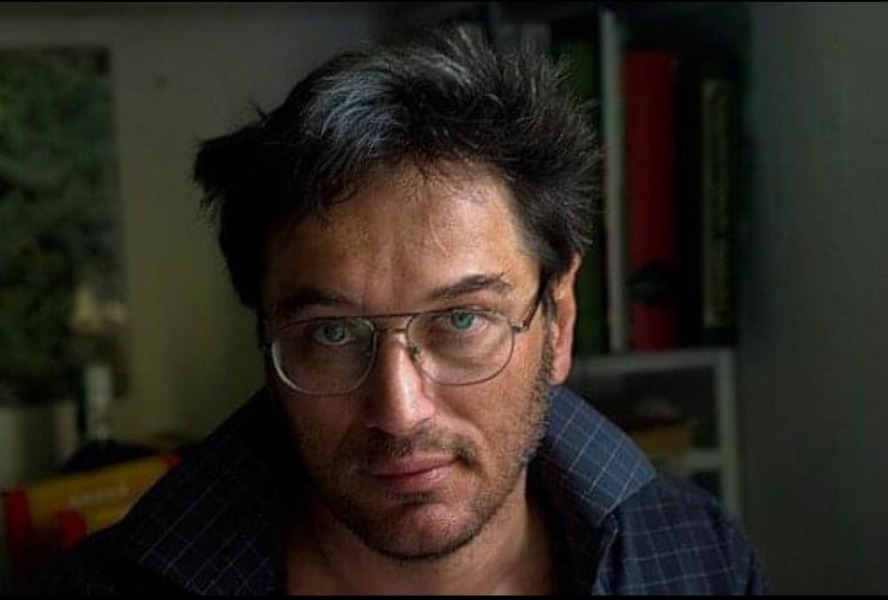Dmitry Khmelnitsky
In the Cypriot city of Limassol, there is a small square called Heroes’ Square. A monument was erected there in 1946, dedicated to all those who gave their lives for the freedom of Cyprus and Greece. On January twenty-sixth, 2024, a Russian rally was held here to commemorate the 80th anniversary of the lifting of the siege of Leningrad in World War II.

The visible part of the activities of the Russian Embassy and the so-called «Russian House» in Cyprus is reduced to the regular organization of such propaganda actions. New, often quite unexpected reasons are sought for them.
The previous public action of this kind — on September 30, 2023 — had a particularly brazen character. It celebrated a new holiday — the annexation to Russia of the occupied territories of Ukraine: the Donetsk and Lugansk «people’s republics», the Zaporizhzhya and Kherson regions. In other words, they celebrated the military territorial seizures, because of which Russia has become a world pariah and for the purpose of stopping the European Union (including Cyprus) imposes more and more new sanctions on Russia.
The celebration in question — the anniversary of the lifting of the blockade — is also new. It complemented the traditional Soviet celebration of victory in the world war on May 9, for obvious reasons. Now, in the midst of the war with Ukraine, Russian propaganda is in great need of any excuse to celebrate military victories and justify its own policies, even those that are blatantly drawn out by ear.
The action at Heroes’ Square in Limassol is characteristic in that it allows us to get to the heart of such events — to understand who, why, and by what methods is now practicing pro-Putin propaganda beyond Russia’s borders.
The first question is «Who?»
To the left and right of the monument to the heroes of Cyprus, to which flowers were laid, there were posters with the logos of the organizers — the Russian Center for Science and Culture (RCSC) and the Coordinating Council of Russian Compatriots.
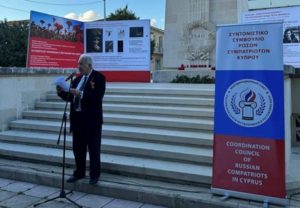
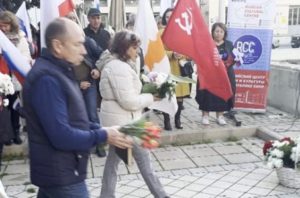
RCSC (or otherwise «Russian House») is a representative office of Rossotrudnichestvo in Cyprus. The full name of Rossotrudnichestvo is «Federal Agency for the Commonwealth of Independent States, Compatriots Living Abroad and International Humanitarian Cooperation». The management of intelligence activities of various Russian agencies (FSB, SVR, GRU) is concentrated in the diplomatic missions of the Russian Federation — embassies and consulates. A special agency, Rossotrudnichestvo, is in charge of working with agents of influence abroad.
Rossotrudnichestvo was established in 2008, but it is the successor of the All-Union Society for Cultural Relations with Abroad (VOKS), which existed until 1958 and then changed its name several times. In the USSR, relations with foreign countries traditionally fell within the competence of the state security service, starting with the UNO OGPU. This situation has not changed in the post-Soviet period, so Rossotrudnichestvo can be safely considered a departmental offshoot of the FSB. Or an independent special service engaged in the recruitment and propaganda processing of migrants from the USSR/Russia. Rossotrudnichestvo has 95 foreign missions, 72 Russian centers of science and culture, and the so-called «Russian Houses», operate in 62 countries. The head of Rossotrudnichestvo since 2020 is Yevgeny Primakov, grandson of former Prime Minister and head of the Russian Foreign Intelligence Service Yevgeny Maximovich Primakov. «Working dynasties» are a common thing in the families of Soviet and Russian state security officers.
Both Yevgeny Primakov himself and the office he heads are under sanctions by the European Union, Ukraine, Switzerland, and Canada for supporting Russian aggression against Ukraine. The European Union views Rossotrudnichestvo as «the main state body projecting the Kremlin’s soft power and hybrid influence, including the promotion of the concept of a ‘Russian World.'» For many years it has acted as an umbrella organization for a network of Russian compatriots and agents of influence, as well as funding various public diplomacy and propaganda projects.» The sanctions may have created technical problems for Rossotrudnichestvo’s Cypriot office, but its activity (and therefore its funding) was not affected at first glance. The Director of the RCSC, Alina Radchenko, was present at the event.
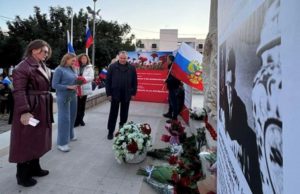
Alina Radchenko (far left), Dmitry Apraksin (center)
The Coordinating Council of Russian Compatriots of Cyprus (CCRCC), is the local branch of the World Coordinating Council of Russian Compatriots Living Abroad. This organization — the executive body of the World Congress of Russian Compatriots (WCRC) — was established in 2001 in Moscow for the ideological consolidation of Russian emigrants. In essence, local CCRCs are Rossotrudnichestvo’s instruments imitating public activity and consisting of the most trusted, loyal, and influential agents of influence in different countries.
In Cyprus, CCRCC has existed since 2008. The first chairman of the Cyprus CSIARC was a certain Igor Nosonov, chairman of the board of directors of the publishing house «Vestnik Kipra», a resident of Cyprus since 1996. He also became Chairman in 2006. Chairman of the Association of Russian-speaking Residents of Cyprus «Horizon», another pseudo-public organization created at the initiative of the «Russian Center of Science and Culture».
From the very beginning, the main task of the CCRCC was to collect information on all Russian-speaking residents of Cyprus, whose files were kept at the embassy. In 2022, Nosonov was succeeded as chairman of CCRC Cyprus by Dmitry Apraksin, a computer programmer and university professor in Nicosia, who came to Cyprus in the early 1990s with a knowledge of Greek and recently announced his intention to run for the European Parliament.
The second question is «Why?»
Why was it necessary to organize such a celebration in the center of Limassol? It would seem that where is the end of the siege of Leningrad in the Second World War, and where is modern Cyprus …
This question was more than clearly answered in his speech by Apraksin, the chairman of the CCRCC. He accused most of the EU countries of complicity with Hitler’s Germany during World War II and drew a parallel between the blockade of Leningrad and the current European sanctions against Russia: «…these countries have not lost the desire to strangle Russia, cause suffering to millions of people and dance on our [Russian] bones. It seemed to our opponents that they would be able to organize another blockade, this time an economic one». It was all for the sake of this forgery.
Apraksin went on in his speech to say that although the total number of sanctions against Russia is approaching 20,000, «we are doing quite well with sanctions.» Curiously, by saying «we», Cypriot citizen Apraksin clearly identified himself with Russia. And with a kind word he recalled its president, who was declared wanted by the International Court of Justice in The Hague: «Trust in the president has been strengthened… Our ill-wishers are exhausted, Russia has become even stronger» — said Apraksin directly in the face of the Cypriot ill-wishers.
More recently, in December 2023, on behalf of the 120,000-strong Russian-speaking community of Cyprus, Apraksin delivered an appeal to Russian Ambassador Murat Zyazikov to Putin to run for president of Russia in the 2024 presidential election.
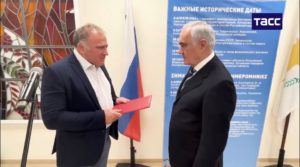
Apraksin (left) and FSB General Zyazikov (right)
The same parallel between the blockade of Leningrad and sanctions against Putin’s Russia was drawn by Russian Ambassador to Cyprus Murat Zyazikov in an interview with TASS correspondent in Cyprus Andrei Surzhansky: «We see how the same forces that fought on the side of Germany against the USSR or helped it are now actually fighting in Ukraine and actively participating in various sanctions coalitions against Russia…But just as they failed to break the spirit of the Russian people then, so today all their attempts are doomed to failure. And the high patriotic spirit of the Russians leaves no doubt about that.»
Zyazikov’s interview with Surzhansky looks somewhat like a conversation between coworkers. Murat Zyazikov is a lieutenant general of the FSB. Andrei Surzhansky, who previously worked in the United States and has been on Ukraine’s sanctions list since 2015, is known as an employee of Russia’s Foreign Intelligence Service (SVR). Such staging is part of professional activities for both of them.
As for the festivities, several dozen protesters, most of whose faces bore the stamp of belonging to the staff of the Russian Embassy and the Russian House, undoubtedly symbolized «the high patriotic spirit of Russians.» But there was one more piquant detail in all this action, which was obviously not realized by those gathered, but which was clearly visible on the video accompanying the TASS report.
The attendees laid flowers at the monument to the heroes of Cyprus right under the number «1940» embossed on it.
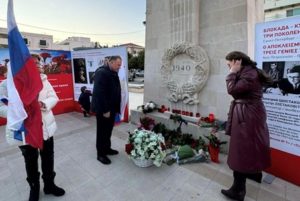
This is an important date in the history of Cyprus and Greece. In 1940 Greece entered the Second World War on the side of England and the Cyprus Regiment was formed in the British Army and participated in the World War.
At the same time, the Soviet Union was allied with Nazi Germany, with which it started the world war by seizing «its» half of Poland and aggression against Finland, and continued in 1940 by annexing the three Baltic states. It turns out that the protesters laid flowers at the monument to the enemies of the USSR. England, Greece and Cyprus were fighting Nazi Germany at that time, while the USSR was its friend and ally. The situation changed in 1941, but not for long. After 1945, the Cold War began, in which Western democracies were confronted not by the National Socialists but by the Soviet dictatorship. Besides, the historical parallel between Stalin’s then seizure of Western Ukraine and Western Belorussia and Putin’s current attempt to seize all of Ukraine is quite obvious. After all, the war is taking place on the same territory.
If we keep all this in mind, the whole presentation, already absurd and cynical, acquires a completely schizophrenic character.
The third question, about the methods by which Putin’s propaganda operates, is also unambiguously answered by the described event.
One of the speakers at the rally, Inna Krymskaya, a member of the CCRCC, stated: «The struggle against Nazism and fascism continues. Nazism and fascism never change their strategies and tactics. They have again decided to organize a modern blockade. Only now for the whole country and for the people of Russia. More than 18,000 points of sanctions in science, culture, sports, economics, and politics. But these gentlemen modern fascists and nazis do not know how to do one thing, they have not learned, and they do not know how to read the chapters of history to the end. If they knew how to do this, they would know that our Soviet people stood up then and our Russian people will stand up today. And of course, they will win.
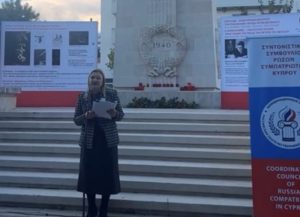
Inna Krymskaya-Petussy
Inna Vladimirovna Krymskaya (Petoussi) is a citizen of Ukraine and Cyprus, born in Mariupol. She has lived in Cyprus since the early 2000s. In 2015, she led a volunteer group to collect aid for Russian-occupied Donbas and participated in pro-Russian rallies.
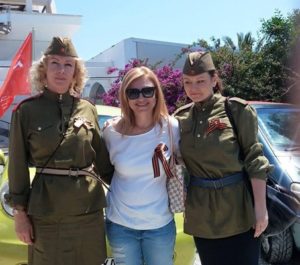
Inna Krymskaya-Petoussi (center)
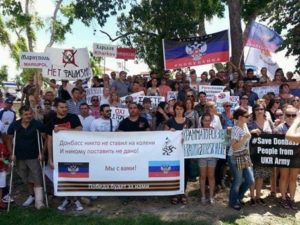
Since 2022, she has been a member of CSRM and an active participant in pro-Russian activities in Cyprus. Krymskaya-Petoussi is a Russian language teacher at one of the adult education centers under the Ministry of Education, Culture, Sports, and Youth of the Republic of Cyprus. She formulated her professional objectives during a teleconference with officials of the occupation government of Crimea in March 2023 as follows:
«‘We, teachers of Russian for foreigners, find ourselves in one of the «hot spots» of the information struggle. We are faced with the task of teaching not only the Russian language but also Russian culture and history. When telling how to construct sentences correctly, we cannot avoid the political aspect of what is going on in the country whose language we are studying.»
In other words, Inna Krymskaya-Petussy considers her profession — teaching Russian — as a way of conducting pro-Putin anti-democratic propaganda among her own students. And this activity is financed by the government of Cyprus, a member of the European Union, which at the same time is making a lot of efforts to fight Putin’s aggression and false propaganda.
Putin’s special services have been parasitizing on this paradox characteristic of democratic countries for many decades. They have perfectly learned how to turn educational centers and Russian cultural societies abroad, which are traditionally financed by local authorities, into their agents of influence for cheap.
Spreading anti-democratic propaganda and recruiting agents in democratic countries under the guise of studying the Russian language and Russian culture is the basis for the activities of Rossotrudnichestvo, the Russian World Foundation, Russian embassies, Russian Houses, friendship societies, associations of graduates of Soviet-Russian universities, and all the other numerous branches of the Russian secret services.
The day after the rally in Limassol’s Heroes Square, on January 27, 2024, another celebration took place with the participation of Krymskaya-Petoussi and many of her colleagues, perfectly illustrating the functioning of the Russian propaganda mechanism. At the Russian Embassy in Nicosia, Ambassador Murat Zyazikov awarded the winners and organizers of the Third All-Cyprus Olympiad in Russian language, held under the motto «Patriotism. Family. Traditions.» The winners were children of «Russian compatriots» in Cyprus and young Cypriots studying the Russian language. In addition to diplomas, the winners (about 30 of them) received cash prizes. Inna Krymskaya-Petoussi is among the awarded teachers.
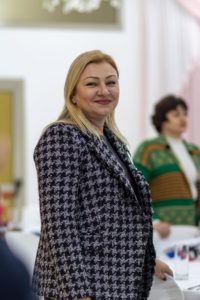
Adult winners of the Olympiad, who study Russian as a foreign language, received as an additional award the first five volumes of the 15-volume book «The Great Victory», translated into Greek by the head of the Cypriot branch of the International Russophile Movement, Mikis Filaniotis.
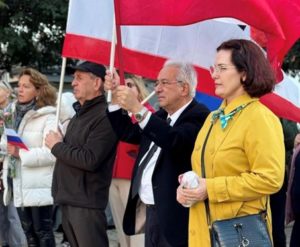
Mikis Filaniotis (center) during the singing of the Russian anthem
This is where various aspects of Russian state security are intertwined into one odoriferous tangle.
The international movement of Russophiles, about which we have already written, is a fake, another fake organization created in Moscow in 2023 from foreign agents of influence with the usual goals for special services — disinformation, propaganda, and recruitment of new agents. The fifteen-volume book «The Great Victory» is Putin’s grandiose falsification of the history of World War II, published in 2015 under the editorship of SVR Director Sergei Naryshkin and MGIMO Rector Alexei Torkunov with purely propagandistic, anti-scientific purposes.
In principle, there is absolutely nothing wrong with teaching Russian anywhere, and to anyone, there is only one benefit. But with one caveat — if Russian state security is not involved.

